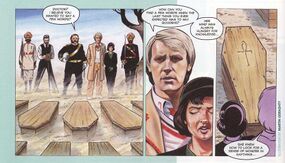The Roof of the World (audio story)
- You may be looking for the first episode of Marco Polo.
The Roof of the World was a Fifth Doctor Big Finish Doctor Who audio story. It was released in 2004, a few days after its author, Adrian Rigelsford, was convicted of stealing thousands of photographs from the Daily Mail and reselling them for personal profit, and sentenced to eighteen months imprisonment.[1] Thus, it is notable for being the only licensed Doctor Who story to have been released while its author was serving a sentence for a criminal offence.
From a narrative standpoint, it was one of the earlier adventures with Erimem. It explored, in part, her ability to cope with time travel and her burgeoning relationship with Peri Brown. It continued Big Finish Productions' tradition of giving narrative relevance to the Fifth Doctor's love of cricket, something that was mostly unexplored on television. It was also one of the few Doctor Who stories to be set in South Asia during the British Raj.
Publisher's summary
It's a time of great exploration, with intrepid teams of adventurers heading blindly into uncharted territory, determined to beat inexplicable odds and overcome any challenge they encounter...
But some things are not necessarily that easy to defeat...
An ancient evil, perhaps older than time itself, is stirring deep within the heart of the Himalayas... It has always known it will return and finish off what it started so many centuries before...
But the time has to be right...
As the TARDIS materialises, with the Doctor determined to take full advantage of an invite to a cricket match, the catalyst that the dark forces need unwittingly arrives...
Plot
to be added
Cast
- The Doctor - Peter Davison
- Peri Brown - Nicola Bryant
- Erimem - Caroline Morris
- Lord Mortimer Davey - Edward de Souza
- Pharaoh Amenhotep II - William Franklyn
- General Alexander Bruce - Sylvester Morand
- John Matthews - Alan Cox
- Pyran - Adrian Rigelsford
References
Elements
- Peri has used liquid nitrogen on the TARDIS swimming pool to make a skating rink.
Foods and beverages
- Unusually for this incarnation, the Doctor uses jelly babies as a bribe to get some Sherpas to transport his TARDIS by yak.
Notes

- This is Adrian Rigelsford's first script for Big Finish. He previously wrote the (unproduced) thirtieth anniversary story The Dark Dimension.
- This audio drama was recorded on 19 and 20 January 2004 at The Moat Studios.
- An illustrated preview for this story appeared in DWM 346 with artwork by Martin Geraghty.
Continuity
- The Second Doctor and his companions, Jamie McCrimmon and Victoria Waterfield, previously visited Tibet in 1935 where they encountered the Great Intelligence and its Robot Yeti for the first time. (TV: The Abominable Snowmen)
- Lord Davey is said to be related by marriage to the Cranleigh family. (TV: Black Orchid; PROSE: The Sands of Time)
- Peri refers to their recent adventures in Egypt in ca. 1400 BC (AUDIO: The Eye of the Scorpion) and the Axis (AUDIO: The Axis of Insanity).
- Peri suggests to the Doctor that they could witness U.S. President Abraham Lincoln deliver the Gettysburg Address on 19 November 1863. The First Doctor and his companions Ian Chesterton, Barbara Wright and Vicki Pallister had previously done so using the Time-Space Visualiser. (TV: The Chase)
- Peri has begun giving Erimem lessons in spoken and written English. (AUDIO: The Axis of Insanity) By the time travellers' encounter with Vlad the Impaler in June 1462, Erimem was reasonably proficient in written English, being able to write Peri several letters in the language. (AUDIO: Son of the Dragon)
External links
- Official The Roof of the World page at bigfinish.com
- The Roof of the World at the Doctor Who Reference Guide
- DisContinuity for The Roof of the World at Tetrapyriarbus - The DisContinuity Guide
Footnotes
- ↑ "'Cunning' photo thief is jailed" news.bbc.co.uk, 25 June 2004

